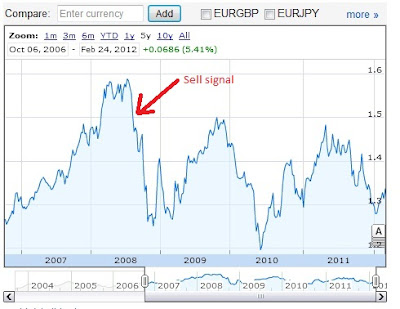Update on EUR vs USD

Back in August 2008, I advised my readers in a post ( Buy USD vs EUR ) of a likely decline of the Euro against the US Dollar because of worsening situation of Europe compared to the United States. And indeed, three years and a half later, the Euro has declined from 1.5 dollars to 1.35 (-10%). What about now? As Euro area is just entering the second leg of a double-dip recession - IMF forecasts -0.5% GDP growth in 2012 compared to +1.8% for the USA. (didn't we also warn you about it? see the post of July 2010 - Double Dip ), a further decline of the Euro wouldn't be surprising... EURUSD exchange rate (Google Finance)
